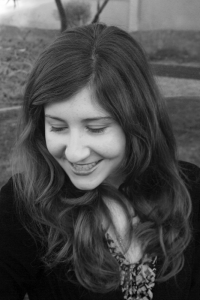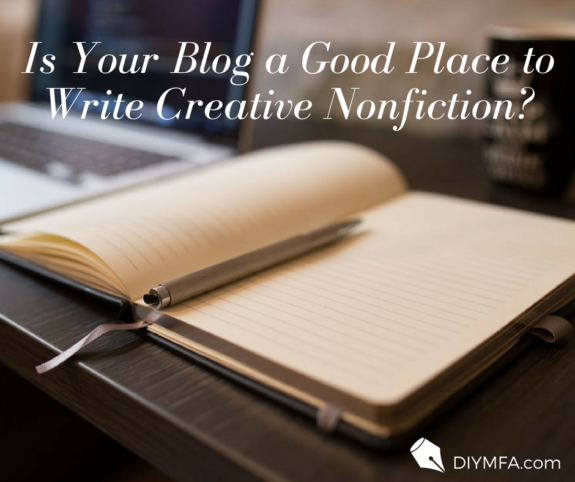Before I started blogging years ago, I didn’t read a lot of blogs or spend much time on news sites. As a college sophomore who desperately wanted to change her major from Engineering to English, fiction was my jam and not much else mattered. Fast forward to 2017, and web writing has become a big deal. I realized that it never hurts to up your writing game when millions read online content every day. But is your blog a good place to write creative nonfiction?
There isn’t just one way to write for the web. Most posts floating around on Pinterest are for content marketers and business owners who want their posts to convert directly into cash. Writing blog posts from a marketing standpoint with lots of calls to action typically works well for online entrepreneurs who sell courses or services. This can be useful: if you haven’t noticed, the world of online business has for better or worse leaked into the realm of fiction writing as many writers are considering alternate ways to make a living as they publish their work.
This still begs the question: is this a good place to write about personal experience?
Write With Purpose
Short answer: Yes, but do so with purpose. If you read a lot of creative nonfiction, you know that there are an array of styles, textures, and stories that still fit under the genre umbrella. Writers for The Atlantic tell stories hooked to the news, but they aren’t opposed to a first-person pronoun. Meanwhile, authors for Hazlitt or Buzzfeed may be able to take both a personal and critical approach, especially when participating in cultural critique.
On the other hand, creative business owners don’t always write with a storied approach, but they often have a lot of personality. That draws people back to their sites. Putting it simply, blogs can be moneymakers in the best of circumstances.
Write With Personality
While personality may seem to be a shrinking quantity, readers tend to return to blogs where they like the writer. And whether you’re blogging about writing craft or your own life, personality matters.
Consider this notable example: Alana Massey, author of a book of essays called All The Lives I Want, got her start writing for xoJane. In a highly trafficked article “I’ve Never Had an Orgasm and I’m the Only Person That Doesn’t Care,” Massey took a highly personal approach that allowed her to continue writing for the site. Her voice and stories were so moving that she was able to write for major outlets like The Guardian, Buzzfeed, and The Atlantic—all without an MFA. She’s written about culture, feminism, sexuality, and identity, all of these articles reliant on her self-aware, fresh voice admired by respected nonfiction writers like Leslie Jamison. It’s only because of her web writing that Massey got a two-book deal with Grand Central Publishing.
Massey is an extraordinary example. She got her start on big-name websites, brands that any writer would be proud to have in their portfolio. After all, she had powerful personal stories that could draw a large audience that worked well as cultural criticism. She had experiences that people wanted to better understand. While she has faced some criticism from rude commenters, Massey has ultimately enjoyed success by writing about her life. Never mind her solid following on Twitter. But you may still be asking how does this translate to blog writing? I thought you said that you don’t have to be the most interesting person to write creative nonfiction.
Write Your Experience
Meg Fee started blogging in 2008 about her experiences living in New York. Posts include what it’s like to turn 30, learning how to be confident, and the serendipitous encounters that have made her life in the city meaningful. Over the years, she’s gathered an audience of thousands who love her voice, originality, and gorgeous photos. Because of a novella she published online, Fee was referred to an agent. Now, she has a book deal with Icon Books for a collection of essays coming out in 2018.
Something to notice about these two writers is that they didn’t necessarily take a traditional approach to joining the arena of published authors. They didn’t get the education you’d expect a writer to have and they chose the themes they wanted to focus on. Whether through notable online outlets or through your blog, there is an opportunity to do the same.
So many writers think they have to write about craft. It’s great to offer advice, but it’s also a beautiful thing to give stories. Truly, it’s all about making your website speak for you. Don’t see a model for how you should go about this whole blogging endeavor? Make up your own; maybe it’s time to start taking a hybrid approach.
No one can promise you a writing career, but the age of the Internet enables more choice than ever. If you aren’t so proud of your blog, now is the time to assess the way you’re writing it. Are your posts too businesslike? Have they stopped speaking to your interests as a writer? Have you grown in the last year? Give your site a facelift. And don’t dwell on the layout; try to get those words squared away first. Writing in a more creative nonfiction style may be your best bet, no matter what subject.
 Kayla Dean is an arts and einment writer in Las Vegas, where she has interviewed several celebrities for publications like Vegas Seven. She has several YA stories in the works and blogs about writing and creativity on her personal website, where she also hosts the Millennial Writer Series. She received her BA in English from the University of Nevada, Las Vegas and will pursue her Master’s in English Literature this fall. You can find her on Twitter@kayladeanwrites.
Kayla Dean is an arts and einment writer in Las Vegas, where she has interviewed several celebrities for publications like Vegas Seven. She has several YA stories in the works and blogs about writing and creativity on her personal website, where she also hosts the Millennial Writer Series. She received her BA in English from the University of Nevada, Las Vegas and will pursue her Master’s in English Literature this fall. You can find her on Twitter@kayladeanwrites.







